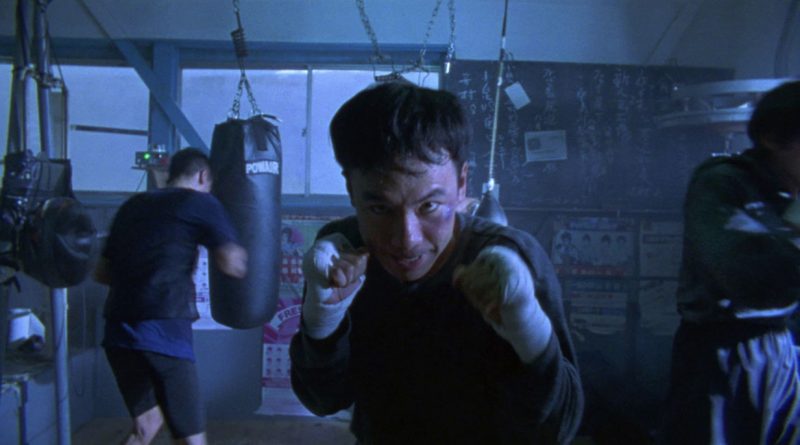‘Tokyo Fist’ Review: A Vulgar Display of Power
Continuing my journey through the works of Japanese underground legend Shinya Tsukamoto, my next stop was his 1995 boxing film Tokyo Fist. As is to be expected, it is anything but your typical sports movie. The film is, in many ways, a continuation of the themes present in Tetsuo I and II. It focuses on the transformative power of rage, urban alienation, mankind’s desire for violence, as well as the self-destructive nature of modern life.
Tsukamoto himself stars as Tsuda Yoshiharu, a door-to-door insurance salesman who lives a comfy risk-free life. He soon runs into an old high-school classmate, Kojima, who is a low-level professional boxer making his way up the ranks. Kojima begins vying for the affections of Tsuda’s girlfriend Hizuru, who finds him intriguing, and the two men begin a violent rivalry.
The film is bursting with wild, kinetic energy. It’s bloody, violent, and intense with fast paced camerawork and expressionistic lighting and color schemes. The boxing scenes are not the most realistic, but they are more accurate than a lot of movies out there, and they perfectly capture the wild emotions of the characters. Imagine Raging Bull on steroids. The film is edited together in an almost impressionistic way, often juxtaposing disparate images across various scenes to form a subconscious linkage between the characters, the world, and the ideas they embody.
Tsuda is not unlike the salarymen of Tetsuo. He is a meek, cowardly, white collar worker who is exhausted by the doldrums of his life. Even his job, selling insurance, hammers home is aversion to risk and to danger. However when his anger is awakened by Kojima, he turns to boxing for escape and becomes a violent maniac in a Fight Club-esque transformation. Similarly, his girlfriend Hizuru has a darkness awakened within her as the two men begin competing for her affections. Exhausted by living a life where she must conform to others’ expectations of what is socially acceptable, she begins to indulge her own thirst for pain and violence as a way to feel something real and meaningful, and to break free from the emptiness of contemporary urban existence. However these violent delights have violent ends, and our characters soon learn that destruction only breeds more of the same, not that they really care at that point.
For all its inventiveness and energy, Tokyo Fist‘s main stumbling block is its narrative. While the film introduces a variety of interesting ideas, events, and threads, they somewhat fail to coalesce at the end of it all. The film’s ending fails to capitalize on the momentum that has been built to that point, leaving several plot threads partially or unsatisfactorily resolved and delivering a final 10 minutes that feels a bit disappointing.
That said, Tokyo Fist is still a wild ride and well worth a watch. From its creative imagery and its hyper-kinetic camerawork to its clever editing and dark sense of humor, Tokyo Fist is a spectacle for the senses. It’s story may not be all there, but it is still one hell of a movie.




